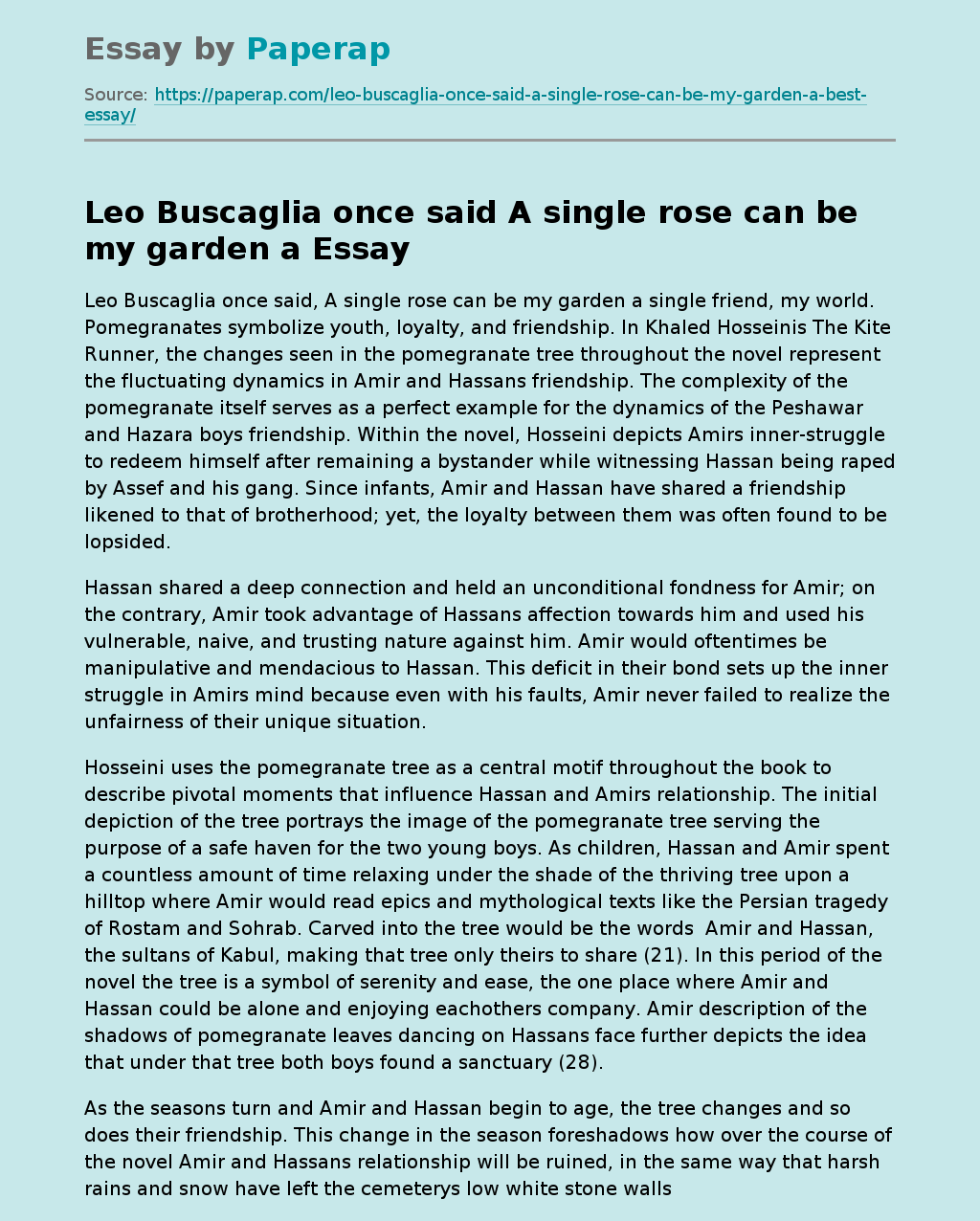Leo Buscaglia once said A single rose can be my garden a
Leo Buscaglia once said, A single rose can be my garden a single friend, my world. Pomegranates symbolize youth, loyalty, and friendship. In Khaled Hosseinis The Kite Runner, the changes seen in the pomegranate tree throughout the novel represent the fluctuating dynamics in Amir and Hassans friendship. The complexity of the pomegranate itself serves as a perfect example for the dynamics of the Peshawar and Hazara boys friendship. Within the novel, Hosseini depicts Amirs inner-struggle to redeem himself after remaining a bystander while witnessing Hassan being raped by Assef and his gang.
Since infants, Amir and Hassan have shared a friendship likened to that of brotherhood; yet, the loyalty between them was often found to be lopsided.
Hassan shared a deep connection and held an unconditional fondness for Amir; on the contrary, Amir took advantage of Hassans affection towards him and used his vulnerable, naive, and trusting nature against him. Amir would oftentimes be manipulative and mendacious to Hassan.
This deficit in their bond sets up the inner struggle in Amirs mind because even with his faults, Amir never failed to realize the unfairness of their unique situation.
Hosseini uses the pomegranate tree as a central motif throughout the book to describe pivotal moments that influence Hassan and Amirs relationship. The initial depiction of the tree portrays the image of the pomegranate tree serving the purpose of a safe haven for the two young boys. As children, Hassan and Amir spent a countless amount of time relaxing under the shade of the thriving tree upon a hilltop where Amir would read epics and mythological texts like the Persian tragedy of Rostam and Sohrab.
Carved into the tree would be the words Amir and Hassan, the sultans of Kabul, making that tree only theirs to share (21). In this period of the novel the tree is a symbol of serenity and ease, the one place where Amir and Hassan could be alone and enjoying eachothers company. Amir description of the shadows of pomegranate leaves dancing on Hassans face further depicts the idea that under that tree both boys found a sanctuary (28).
As the seasons turn and Amir and Hassan begin to age, the tree changes and so does their friendship. This change in the season foreshadows how over the course of the novel Amir and Hassans relationship will be ruined, in the same way that harsh rains and snow have left the cemeterys low white stone walls in decay (27).
With Hassans insistence, both he and Amir return to the tree after his traumatizing sexual assault; a sense of hope for the rekindling of the friendship. Amirs guilt for the role he played in Hassans rape causes him to be overwhelmed by the memories of the happier times they shared under their pomegranate tree. Amirs guilt leads to him provoking Hassan to condemn him for his own reluctance to aid Hassan when he was being raped. Amirs motive to make Hassan hold as much disdain as he already held for himself is revealed when he picked up an overripe pomegranate and throws it at Hassan (92). As Amir throws the fruit at Hassan, he continuously calls Hassan a coward when in reality he is the true coward and Hassan is an easy target for him to use to release his anger and frustration. This rotting pomegranate is symbolic of a wound left exposed to fester, the effects of Amirs self-reproach.
Leo Buscaglia once said A single rose can be my garden a. (2019, Nov 30). Retrieved from https://paperap.com/leo-buscaglia-once-said-a-single-rose-can-be-my-garden-a-best-essay/

